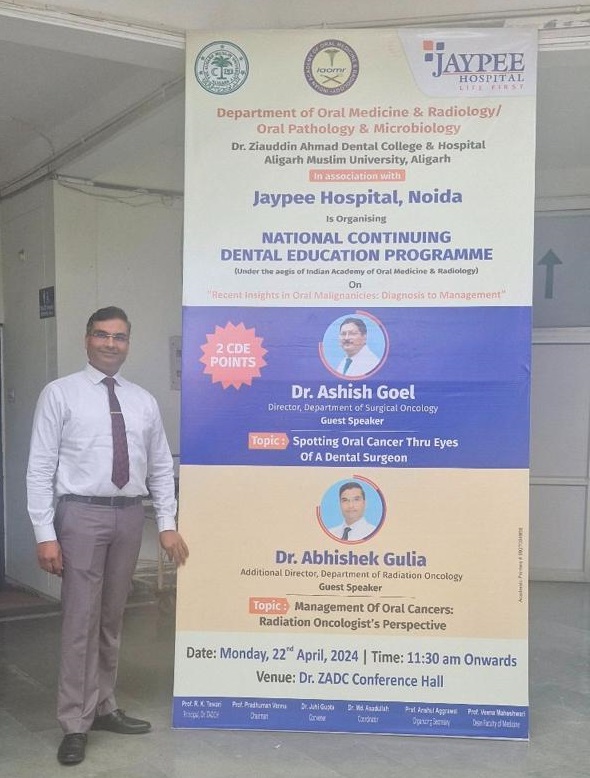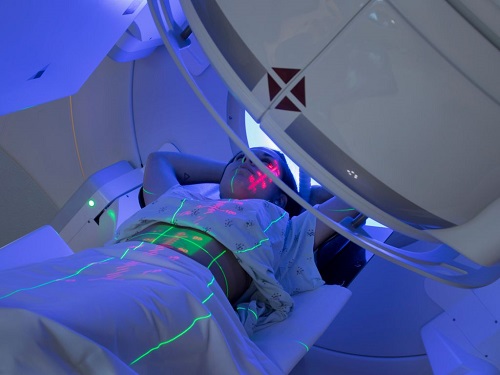Why Choose Dr Abhishek Gulia?
Director, Department of Oncology, MAX Superspeciality Hospital NOIDA, a NABH-accredited hospital in NOIDA, Delhi, NCR, equipped with the latest TrueBeam STx LINAC Machine with microMLC (HD120) and a 6-D robotic couch.
Director, Department of Oncology, MAX Superspeciality Hospital NOIDA, a NABH-accredited hospital in NOIDA, Delhi, NCR, equipped with the latest TrueBeam STx LINAC Machine with microMLC (HD120) and a 6-D robotic couch.
Advanced Radiation techniques (SBRT) and Extreme hypofractionation Under Prof Carlo Greco, Champalimaud Centre for the Unknown, Lisbon, Europe
Received Infosys Foundation Gold Medal for highest marks in Medicine and Surgery.
Life Member of Association of Radiation Oncologists of India (Reg. No. LN 1393)

.png)
Throat cancer which includes cancers of the larynx (voice box), pharynx, and surrounding areas is one of the most common and most curable cancers. In the early stage 1 to stage 3, high cure rates are achieved with precise Radiation Therapy and Surgery is not recommended.

Cervix cancer is the cancer of lower part of uterus and it is one of the most common cancer in Indian women. While the common perception is that for cervix cancer the best way to cure would be to surgically excise the uterus, actually this is incorrect.
Cervix cancer is best treated with focussed and precise Radiation therapy to the tumour and surrounding lymph nodes where tumour cells .

Radiation therapy offers high cure rates in prostate cancer patients, in both localised and advanced disease. As per literature in the western world, most Prostate Cancer patients are treated with Radiation Therapy without any Surgery and in India too now with increasing awareness, many patients opt for this effective, convenient non-surgical option due to lesser side effects as compared to invasive options.
Patients Cured
Years of experience
Awards Received
Radiation therapy is a type of cancer treatment that uses high doses of radiation to kill cancer cells and shrink tumors. Learn about the types of radiation, why side effects happen, which side effects you might have, and more.
Radiation therapy damages cells by destroying the genetic material that controls how cells grow and divide. While both healthy and cancerous cells are damaged by radiation therapy, the goal of radiation therapy is to destroy as few normal, healthy cells as possible. Normal cells can often repair much of the damage caused by radiation.

Chemotherapy is a drug treatment that uses powerful chemicals to kill fast-growing cells in your body. Chemotherapy is most often used to treat cancer, since cancer cells grow and multiply much more quickly than most cells in the body. Many different chemotherapy drugs are available.
t targets cells that grow and divide quickly, as cancer cells do. Unlike radiation or surgery, which target specific areas, chemo can work throughout your body. But it can also affect some fast-growing healthy cells, like those of the skin, hair, intestines, and bone marrow. That’s what causes some of the side effects from the treatment.

Hormone therapy is a treatment that slows or stops the growth of breast and prostate cancers that use hormones to grow. Hormone therapy can reach cancer cells almost anywhere in the body and not just in the breast. It's recommended for women with tumors that are hormone receptor-positive. It does not help women whose tumors don't have hormone receptors.

Hyperthermia is a type of treatment in which body tissue is heated to as high as 113 °F to help damage and kill cancer cells with little or no harm to normal tissue.
Hyperthermia is almost always used with other forms of cancer treatment. Many clinical trials have shown that hyperthermia, when used with treatments such as radiation therapy and chemotherapy, helps shrink tumors and may make it easier for them to kill cancer cells.

Immunotherapy is a type of cancer treatment that helps your immune system fight cancer. The immune system helps your body fight infections and other diseases. It is made up of white blood cells and organs and tissues of the lymph system.
Immunotherapy is a type of biological therapy. Biological therapy is a type of treatment that uses substances made from living organisms to treat cancer.
.jpg)
Photodynamic therapy (PDT) is a treatment that involves light-sensitive medicine and a light source to destroy abnormal cells.
It can be used to treat some skin and eye conditions, as well as certain types of cancer.
On their own, the medicine and light source are harmless, but when the medicine is exposed to the light, it activates and causes a reaction that damages nearby cells.
This allows small abnormal areas of tissue to be treated without the need for surgery.


Dr. Abhishek Gulia is a highly experienced and accomplished oncologist with over 14 years of dedicated service in the field of oncology and radiation oncology. Renowned for his commitment to patient care and excellence in cancer treatment, Dr. Gulia is widely recognized as one of the best cancer specialists in Noida, Delhi, and across the National Capital Region (NCR). His clinical expertise, combined with his compassionate approach, has made him a trusted name in cancer care.
Dr. Gulia has a keen clinical interest in multiple sub-specialties within oncology, including breast oncology, head and neck oncology, and thoracic oncology. These are some of the most challenging and common cancer types, and his focused expertise in these areas ensures that patients receive the most precise and effective treatment plans. In addition to his specialization in these areas, Dr. Gulia is also thoroughly trained in the management of gastrointestinal cancers, genitourinary cancers, and gynecological cancers. His wide-ranging knowledge allows him to treat a broad spectrum of cancer cases with confidence and precision.
Currently, Dr. Abhishek Gulia serves as the Director of Radiation Oncology at Max Super Speciality Hospital in Noida. This prestigious position reflects not only his years of experience but also his leadership and commitment to advancing cancer care in the region. At Jaypee Hospital, he leads a team of dedicated professionals and oversees the planning and execution of complex radiation therapy treatments tailored to individual patient needs.
Dr. Gulia’s technical expertise in advanced radiation therapy is extensive. He is highly skilled in the use of modern radiation techniques such as Intensity-Modulated Radiation Therapy (IMRT), Image-Guided Radiation Therapy (IGRT), Volumetric Modulated Arc Therapy (VMAT)/Rapid Arc, and Stereotactic Radiosurgery (SRS). He also performs treatments using the Gamma Knife Radiosurgery system and Stereotactic Body Radiotherapy (SBRT). These methods allow for precise targeting of cancerous tissues while minimizing damage to surrounding healthy tissues. Additionally, he utilizes cutting-edge techniques like Gating and Deep Inspiration Breath Hold (DIBH) for radiation delivery, which are especially beneficial in treating breast and thoracic cancers.
A significant part of Dr. Gulia’s practice includes treating advanced and recurrent cancers. He is specially trained in the integration of combination immunotherapy and targeted therapy with SBRT to elicit the maximum possible immune response from the body. These personalized treatment approaches have shown promising outcomes and are considered the future of cancer care.
In addition to treating patients directly, Dr. Abhishek Gulia is available for second opinions, offering valuable insights and guidance for patients seeking clarity or alternate views on their diagnosis and treatment plan. His approachable demeanor and deep knowledge make him a preferred consultant for patients from all over India and abroad.
With his base in Noida and services extending across Delhi and NCR, Dr. Abhishek Gulia remains committed to providing world-class cancer care that combines cutting-edge technology with personalized attention to each patient’s journey.